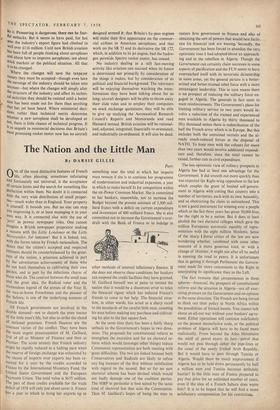No Future in the Air
By OLIVER STEWART
So aeroplanes are no, longer to be individual expressions of engineering knowledge and experience; they are to become part of the furni- ture of politics and finance. To meet the demands of political theory and of modern monetary prestidigitation, the aircraft industry is being forcibly regrouped in fewer, larger units. Authority has decided that bigness is best and that success in aeronautics is simply a matter of size. We are instructed to marvel at the American pro- duction lines. Invention, originality and variety are nothing; production is all. The British in- dustry, like the singers of popular songs, must get as near as it can to speaking with an American accent.
Apart from the siting of the engines, close to the tail, in the manner of the French Caravelle, the new jet air liner designs so far reported dis- close a depressing absence of originality and of technical adventurousness. They are all-too- ordinary aircraft. The rear-mounted engines will give advantages in noise reduction in the pas- senger cabin and in improved performance and handling on asymmetric power. But where improvement is most needed, nothing radical is proposed. The aircraft, it has been said, will have a better field performance than the Boeing 707 and the Douglas DC8. But they will still have to charge for miles along enormous runways before they can transfer their weight from wheels to wings or from wings to wheels. They will not profit from the vast amount of British work on blown flaps, jet flaps, jet lift and boundary layer control. They are built in the image of their competitors, yet they will arrive on the scene years after them.
In the fuss about finance, nobody has even mentioned speed range. The hidden subsidies of airports with runways three kilometres long are accepted. The succession of papers read before the learned societies by technical men on how to improve the low speed performance of aircraft are ignored. The British aircraft industry is to be forbidden to indulge in its earlier pioneering practices. Yet results' suggest that those practices had merit. Although the Germans were first with jet engines, the Whittle jet was a good second. Big jet-driven delta aircraft were first developed by the British industry as were the first turboprop airliners, the first turbojet airliners, the first light- weight jet fighter, the first jet flying-boat fighter, the first crescent wing aircraft, the first big by-pass engine. In fact, until now, the industry has lived by its inventiveness, its enthusiasm and its readiness to, enter new fields of technical experience. It has not lived by large-scale series production and it is unlikely that it ever could live by it. Pioneering is dangerous; there can be fear- ful setbacks. But it seems to have paid, for last Year the industry's export figure had climbed to Well over £116 million. Until now British aviation has been full of people thinking about aeroplanes and about how to improve aeroplanes, not about stock markets or the political situation. All that Is to be changed.
Where the changes will save the taxpayer money they must be accepted—though even here the earnings of the industry should be taken into account—but where the changes will simply alter the structure of the industry and affect its techni- cal activities they should be resisted until a better H ease has been made out for them than anything that has yet been heard. Where ministerial deci- sions rather than technical merits determine Whether a new aeroplane shall be developed or not, there is little chance of technical progress. It IS as sequels to ministerial decisions that Britain's most promising rocket motor now has no aircraft designed around it; that Britain's by-pass engines will make their first appearance on the commer- cial airlines in American aeroplanes; and that work on the SR 53 and its derivative the SR 177, which, in addition to its jet engine, had the hydro- gen peroxide Spectre rocket motor, has ceased.
No industry dealing in a still fast-moving activity like aviation can succeed when its future is determined not primarily by consideration of the things it makes, but by consideration of its political and financial background. The reformers will be enjoying themselves watching the trans- formation they have been talking about for so long; aircraft designers will be able to throw away their slide rules and to employ their computers on stock exchange quotations; they will be able to give up studying the Aeronautical Research Council's Reports and Memoranda and read Hansard instead. British aviation will be rational- ised, adjusted, integrated, financially re-orientated, and industrially co-ordinated. It will also be dead.



































 Previous page
Previous page